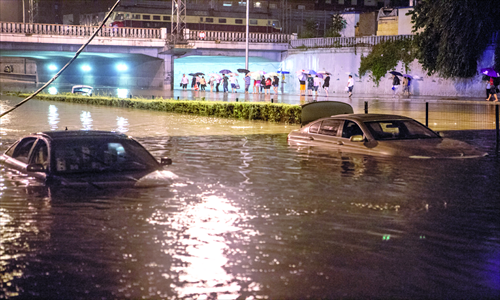Beijingers turn to Weibo to beat floods

People in Beijing turned to social network sites to help those left stranded by the heaviest rainstorm in six
decades over the weekend by offering free rides, accommodation and meals.
Analysts say the behavior of Beijingers showcased the forming of a civil society, in which people are seeking ways
to organize their own institutions to respond to social needs and convey concerns in a way which influences the
policy-making process.Ye Teng and her husband arrived at Beijing Capital International Airport at 3 am on Sunday only to find that there were no taxis and the Airport Express was closed down due to the rainstorm.
The couple were among 80,000 passengers held up at the airport, but private cars driven by volunteers who answered calls on the Internet and lined up outside the airport finally got them home.
Wang Lu, 29, called on car owners living in Wangjing, the neighborhood closest to the airport, to offer free rides
to passengers on Weibo, China's most popular microblogging site.
"I was thinking that we couldn't just sit comfortably at home and do nothing. But I didn't expect so many people
to have the same idea," Wang Lu told the Global Times.
From 0:30 to 5:30 am on Sunday, over 300 cars from different districts in Beijing drove to the airport, an anonymous traffic police officer working at the airport told the Global Times.
Lu Miankun, 50, who returned to Beijing from Russia for the first time in 10 years, said he was impressed by the
kindness of Beijingers. "I might have had to stay at the airport all night without the volunteer drivers."
More people joined the team offering help on Weibo.
Zhu Guofan, a private entrepreneur, announced on Weibo that his company was offering rooms and refreshments free to people stuck in the rain.
Wang Xiaoyu, a professor at Tongji University in Shanghai, told the Global Times that many relatively well-educated people who often keep an eye on social network sites such as Weibo tend to be more active in social work and more capable of helping others.
"People act before the government officials and we can see people's public spirit in special events like this. The
rainstorm offered an opportunity for people to show their care and love," Wang Xiaoyu added.
He Yongqiang, who works in a non-governmental organization, said in his Sina Weibo that the deeds of volunteers who lent a helping hand to others in the rainstorm showcased the feature of a civil society.
Li Chengpeng, a popular commentator, echoed the sentiment in his Weibo post, saying that the awareness of the
obligations of citizens has been taking shape.
"By taking part in social administration and management, people could feel a strong sense of existence and
security," commented Li.
However, while many people offered to lend a helping hand, some took advantage of the rain. Some cabs around Sanyuan bridge, Chaoyang district were found to be charging 900 yuan ($141.20) as a starting price to people desperately needing a ride.
"I saw a girl bargaining with the cab drivers. When I offered a free ride, I was threatened by the cab drivers and
told to stay out of the way," a man who volunteered to help and requiring anonymity told the Global Times.
Meanwhile, others expressed their anger at patrolling police who handed out violation tickets to stranded cars that
had been abandoned by their owners, the Xinhua News Agency reported.
Expressway operations were also criticized, as workers continued to collect fees at toll gates on the airport
expressway, as vehicles in long queues were stuck in knee-high water.
Xinhua quoted Xia Xueluan, a Peking University sociologist, as saying that city authorities should take a more
"humane" approach when handling such emergencies.
"More flexible measures should be adopted in those cases," Xia said.